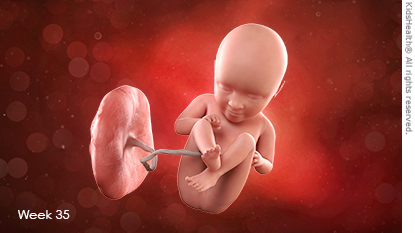- Home
- Humana Medicaid
- Kentucky Medicaid
- Medicaid extras
- Health and wellness
- Parents Home
- Para Padres
- A to Z Dictionary
- Allergy Center
- Asthma
- Cancer
- Diabetes
- Diseases & Conditions
- Doctors & Hospitals
- Emotions & Behavior
- First Aid & Safety
- Flu (Influenza)
- Food Allergies
- General Health
- Growth & Development
- Heart Health & Conditions
- Homework Help Center
- Infections
- Newborn Care
- Nutrition & Fitness
- Play & Learn
- Pregnancy Center
- Preventing Premature Birth
- Q&A
- School & Family Life
- Sports Medicine
- Teens Home
- Para Adolescentes
- Asthma
- Be Your Best Self
- Body & Skin Care
- Cancer
- Diabetes
- Diseases & Conditions
- Drugs & Alcohol
- Flu (Influenza)
- Homework Help
- Infections
- Managing Your Weight
- Medical Care 101
- Mental Health
- Nutrition & Fitness
- Q&A
- Safety & First Aid
- School, Jobs, & Friends
- Sexual Health
- Sports Medicine
- Stress & Coping
Pregnancy Calendar: Week 35
Your Baby's Development
This week begins your baby's most rapid period of weight gain — about 8 to 12 ounces (226 to 340 grams) each week! Fat is being deposited all over your baby's body, especially around the shoulders. The vernix coating on the baby's skin is becoming thicker, whereas lanugo hair is almost completely gone.
This increasing size means that your baby is now cramped and restricted inside the uterus — you might feel fewer movements, but they may be stronger and more forceful. If in a headfirst position, your baby's head will rest on your pubic bone in preparation for labor.

Your Body
Your bond with your baby will be even stronger once your little one is here. Bonding doesn't only happen right after birth. It may happen later or develop over time. Bonding makes parents want to protect their baby and shower him or her with affection, and it builds a baby's sense of security.

© 1995- The Nemours Foundation. KidsHealth® is a registered trademark of The Nemours Foundation. All rights reserved.
Images sourced by The Nemours Foundation and Getty Images.

